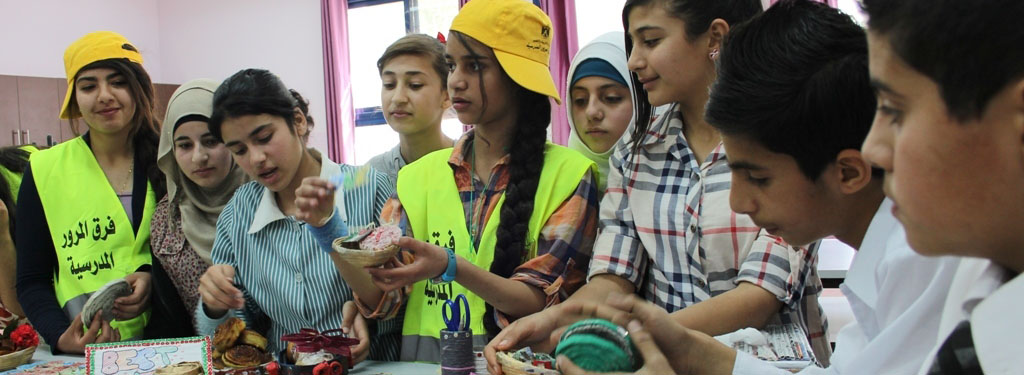Professional Development Programme
Arts in Education
- Drama in Education Programme
- The seventh Drama in Education Summer School was held over 17 days with the participation of 94 instructors and learners (nine from Gaza, 18 from pre-1948 Palestine, and 67 from the West Bank). The school instructors included nine teachers, three of whom were Palestinians.
- The Drama Teachers’ Forum was held three times during the year. It explored Waiting for Godot by Samuel Beckett, the inquiry-based teaching approach Mantle of the Expert, Diab, a play by Amer Hlehel, and the application of drama in lesson plans.
- Reading and Dialogue: Two sessions were organised to explore the essay, “The Relation between Drama and Theatre,” by Norah Morgan and Juliana Saxton, and the essays “Setting forth Questions and Answers,” and “Evaluation and Analogy”.
2. Animation in Education
The Animation in Education project carried out a training programme in The Jerusalem district, including workshops in:
- Film voiceover for animation, for teachers in the Early Childhood Programme
- Doll and scenery-making
- Animation, as part of the Ramallah Municipality Centenary celebrations
- Animation, with a group of teachers from the Gaza Strip, via video conference.
Teachers and students from seven schools who received training in the first phase of the project have become qualified to teach other teachers and students in the project’s current phase.
3. School and Cinema
For the School and Cinema project, 25 short Palestinian and Arab films were selected, each telling a child’s coming-of-age story. The films will be distributed to the schools that participated in the project. Through watching and discussing the films, students will have the opportunity to exercise their critical faculties and to learn about the language of film.
A workshop on cinematic culture was organised as part of this project, which focused on developing critical skills for interpreting film.
Early Childhood
- Professional Development for Early Childhood Teachers
A new group of female kindergarten teachers, from Jerusalem and its suburbs, participated in a 126-hour training programme held throughout the year. This included courses on drama in education, enquiry and learning through projects, the Mantle of the Expert approach to drama in the classroom, as well as teaching and learning, story in education and animation in education.
2. Graduation Ceremony for Kindergarten Educators
In December 2012, 38 female kindergarten principals and educators graduated from the Professional Development programme. The closing ceremony included educators presenting the educational projects they had already implemented in their classrooms.
Professional Development for Science Teachers
The Walid and Helen Kattan Science Education Project launched the Professional Development Programme, in which three teacher-training courses were held for selected schools in Jericho. These included: Learning through the Project, Teaching Science using Mantle of the Expert, and Science Enquiry.
An Informal Science Programme was also launched. This included an initiative called Science Snacks, which aims to foster students’ interests in science through fun, easy, and interactive experiments. Students of all ages as well as parents and teachers took part in activities such as observing the transit of Venus, learning about the landing of Curiosity Rover on Mars, a Students’ Science Forum, a Facebook page (Creative Minds), and an origami workshop.
Professional Development through Storytelling
For this programme teachers wrote their personal stories and reflected on their professional experiences. Fourteen stories from the programme were published in Ru’a Tarbawiya magazine. A training day was also organised, entitled Interactive Teaching and Reflective Evaluation, for teachers in the district of Qalqilia.
Professional Development through Project-Based Learning
This programme works to deepen students’ and teachers’ understanding of the connections between their school, their community, and wider society. It includes the following initiatives:
- Hosting authors/ scholars from Jerusalem
- Creating safe places to play in the village of Kafr Abboush
- A course on the anthropology of medicines and diseases
- The Towns and Tales project
- Education through the Arts – dream sharing between Palestinians in Gaza, Jerusalem, Lebanon, and West Bank
- A course on hygiene in educational and social contexts
- The Clean Dayr Qiddees project
- The Fossils project
- The Qabia Massacre project
Professional Development for Teaching History
The teachers involved in this project have been working with their students on history-related initiatives. A workshop for history teachers was also organised, entitled From the Old Ages Until Today: Palestinian Identity and the History Curriculum. Sessions were also held with writer Aisha Odeh, and Yasir Qaws from the African Community Association, who gave a presentation on the history of the African community in Jerusalem.
 |
|
| Participants at one of the Drama in Education Summer School courses supervised by Luke Abbott | |
|
|
|
|
“Contemporary strategies in teacher training are based on the belief that the student is not only a learner, but a self-teacher as well. Approaches to teaching that take this on board can be greatly aided by the use of drama, which is very close to the child’s world of play, imagination.” Ola Badawi (Drama in Education Summer School student) |
|
 |
|
|
Teachers making clay models during one of the Animation in Education Project workshops |
|
|
“The workshops taught us valuable skills. They focused on empowering us to move from being a ‘consumer’ and ‘recipient’ to become a ‘producer’ of learning, someone who is in control of his or her own learning.” An early childhood educator
|
|
.jpg) |
|
| Children doing simple experiments during a Science Snacks event |
|
| |

